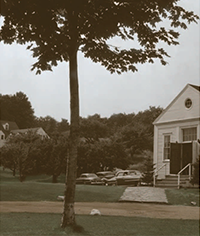“I didn’t plan to be the president of a small liberal arts college in Vermont,” wrote President Ellen McCulloch-Lovell in an article in the February 26 issue of The Chronicle of Higher Education. “I didn’t expect to fall in love when I drove up the hill to Marlboro College to meet the members of this intellectual and creative community.” In the article, titled “Two Nontraditional Presidents Speak Out: We Bring with Us a Healthy Impatience,” Ellen shared her perspective on the benefits and challenges of being a college president who comes from a nonacademic background. Her editorial was paired with one from James Danko, president of Butler University, also among the 13 percent of “nontraditional” presidents.
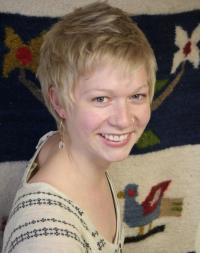 “I’m bringing my background in medical anthropology into my personal experiences in Nepal and the experiences shared with me through narratives,” said senior Cailin Marsden (right), who is doing her Plan on cross-cultural approaches to childbirth. She spent the fall semester in Nepal on a program with the School for International Training, exploring the history and socioeconomics of Tibetan refugee communities. For her independent project, she interviewed village families about their birth experiences. “I’m interested in learning about the greater health care system in Nepal and what maternal health care looks like, especially in rural settings.”
“I’m bringing my background in medical anthropology into my personal experiences in Nepal and the experiences shared with me through narratives,” said senior Cailin Marsden (right), who is doing her Plan on cross-cultural approaches to childbirth. She spent the fall semester in Nepal on a program with the School for International Training, exploring the history and socioeconomics of Tibetan refugee communities. For her independent project, she interviewed village families about their birth experiences. “I’m interested in learning about the greater health care system in Nepal and what maternal health care looks like, especially in rural settings.”
Art faculty members Tim Segar and Cathy Osman presented a show of their work in January and February at the Catherine Dianich Gallery in Brattleboro. Tim shared more painting and drawing than usual, along with two bronze castings, while Cathy showed paintings on clay board and a relief sculpture. Their show overlapped with “Four Eyes: Art from Potash Hill,” a show including Cathy, Tim, photography professor John Willis and ceramics professor Martina Lantin, at the Brattleboro Museum and Art Center (Potash Hill, Winter 2012). Tim said, “The two shows combined provided a unique opportunity to see a broad range of work by these artists made at various times over their careers.”
In April, philosophy professor William Edelglass gave the keynote address at Indiana University Southeast, part of their yearlong program on climate change, as well as a talk on Indian Buddhist philosophy. His address was called “Are We Morally Responsible for Climate Change?” “Even if the consequences of my own daily actions are negligible, I bear responsibility for the suffering that results from climate change when cumulatively the consequences of our actions are catastrophic,” William said. This is also the subject of his chapter in Facing Nature: Levinas and Environmental Philosophy, a book he co-edited, published by Duquesne University Press this year. William was also recently elected to the executive committee of the International Association of Environmental Philosophy.
“I realized that if I’m going to be studying international journalism as a means of human rights observation and democracy, I should probably get out of the United States,” said junior Sean Pyles (right). He spent the fall 2011 semester at John Cabot University, an American school based in Rome, taking classes in Writing for Advocacy and Television and Democracy. “The latter was essentially a crash course in the corruption of Italy’s media and the life of Silvio Berlusconi,” said Sean, who was in Italy when the prime minister was ousted. “I was feeling frustrated with the lack of democratic media around me, so I started a newspaper as a backlash. I learned the impact of journalistic activism and the importance of a free media for a functional democracy.”
Senior Cait Charles spent the fall 2011 semester in Nepal, studying Buddhism at a school located in a Tibetan Buddhist monastery, with some of the classes taught by accomplished scholar-monks. She followed this with a trip to India to visit Buddhist pilgrimage sites, including Bodhgaya, where the Buddha reportedly attained enlightenment. “I attended the 32nd Kalachakra, an event during which the Dalai Lama gives 11 days of teachings, rituals and empowerments,” said Cait. “It was ridiculously crowded; hundreds of thousands of people from all over the world came and flooded this tiny town that normally holds 30,000 people.” She spent the rest of the spring and summer visiting “ecovillages” in Thailand and Europe, part of her Plan research on the social, ecological, economic and cultural/worldview dimensions of sustainability.
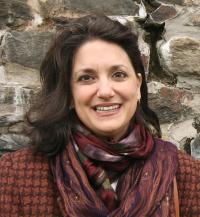 In April, Susie Bellici (right) traveled to Iraq, under the auspices of the state department and World Learning, to facilitate training at a conference for the Iraqi Young Leaders Exchange Program. IYLEP is a program that enables Iraqi students to study at American institutions, develop leadership skills and build action plans to strengthen the future of Iraq. “Training from 8 to 5 was tiring, but these students were amazingly inspiring,” said Susie, who is the associate director of world studies at Marlboro. “They are ranked in the top 1 percent of Iraqi university students—for activism, civic engagement and academics—so their conversations were thoughtful, passionate and knowledgeable. I was privileged to be there.”
In April, Susie Bellici (right) traveled to Iraq, under the auspices of the state department and World Learning, to facilitate training at a conference for the Iraqi Young Leaders Exchange Program. IYLEP is a program that enables Iraqi students to study at American institutions, develop leadership skills and build action plans to strengthen the future of Iraq. “Training from 8 to 5 was tiring, but these students were amazingly inspiring,” said Susie, who is the associate director of world studies at Marlboro. “They are ranked in the top 1 percent of Iraqi university students—for activism, civic engagement and academics—so their conversations were thoughtful, passionate and knowledgeable. I was privileged to be there.”
“I use photography, teaching and working with others as a means to try and see how I fit into the world, attempting to share with others in our search for value and meaning,” said John Willis, photography professor. His presentation in April, “How Might We Use Artistic Practice in Service?” was part of an academic speaker series called Art, Empathy and Social Change, held at Landmark College this spring semester. “I believe I gain as much as, if not more than, my subjects by spending time with them and collaborating within the artistic process. I only hope my presence and work can also be beneficial to those I work with.” Philosophy professor Meg Mott was featured in February, with a talk about extending rights to natural objects titled “On the Emancipation of Eagles."
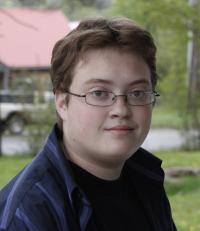 In April, the annual Tolkien conference at the University of Vermont brought J.R.R. fans from around New England to learn from eminent scholars about “Tolkien’s Bestiary.” These scholars included Marlboro sophomore Ray Saxon (right), who presented a paper titled “Manwë’s Messengers: The Role of Eagles in Middle Earth.” “I found that there are many commonly held misconceptions about the eagle’s role in Tolkien’s stories,” said Ray, whose paper explored the author’s true intentions in the matter. “The audience was very receptive, despite the fact that I was an undergraduate speaking alongside professors and independent scholars. I am so honored to have been given this opportunity, and proud to have represented Marlboro College.”
In April, the annual Tolkien conference at the University of Vermont brought J.R.R. fans from around New England to learn from eminent scholars about “Tolkien’s Bestiary.” These scholars included Marlboro sophomore Ray Saxon (right), who presented a paper titled “Manwë’s Messengers: The Role of Eagles in Middle Earth.” “I found that there are many commonly held misconceptions about the eagle’s role in Tolkien’s stories,” said Ray, whose paper explored the author’s true intentions in the matter. “The audience was very receptive, despite the fact that I was an undergraduate speaking alongside professors and independent scholars. I am so honored to have been given this opportunity, and proud to have represented Marlboro College.”
Spanish language professor Rosario de Swanson’s work on the literature of Equatorial Guinea (Potash Hill, Summer 2011) has been published as part of a United Nations Project to redress the rights of Afrodescendants, as people of African descent are called in Latinoamerica. Afrodescendencia: Aproximaciones contemporáneas desde América Latina y el Caribe recovers much of the forgotten history of these populations in Argentina, Brazil, Colombia, Mexico, Central America and the Caribbean. Rosario’s article examines women’s oppression in Ekomo, the first novel written by a woman in Equatorial Guinea. “My article is intended to shed light within Latin America on the literature, culture and arts of Equatorial Guinea,” said Rosario. “This is important because many of the slaves brought to Latin America came from the general region where Guinea is located.”
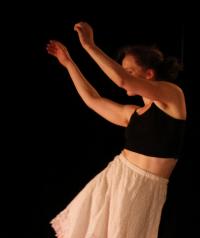 “A dance student at Marlboro is not like a dance student anywhere else,” said Cookie Harrist ’12 (right), who was chosen for a national conference gala performance at the John F. Kennedy Center for the Performing Arts in Washington, D.C. “We constantly question why we dance the way we dance.” The solo dance Cookie choreographed, titled “Present Present Present,” is an ambitious three-part piece that peels back the layers of artifice separating dancer from audience. Cookie brought “Present Present Present” to the 2012 National College Dance Festival, held on May 25 to 27, a biennial event showcasing the outstanding quality of choreography and performance created on college and university campuses across the country.
“A dance student at Marlboro is not like a dance student anywhere else,” said Cookie Harrist ’12 (right), who was chosen for a national conference gala performance at the John F. Kennedy Center for the Performing Arts in Washington, D.C. “We constantly question why we dance the way we dance.” The solo dance Cookie choreographed, titled “Present Present Present,” is an ambitious three-part piece that peels back the layers of artifice separating dancer from audience. Cookie brought “Present Present Present” to the 2012 National College Dance Festival, held on May 25 to 27, a biennial event showcasing the outstanding quality of choreography and performance created on college and university campuses across the country.
Hot on the heels of Drew Tanabe ’12, who was in Japan when it was rocked by the tsunami and resulting nuclear disaster last year (Potash Hill, Summer 2011), three students pursued their studies in Japan this year. In the fall semester, senior Gordie Morse went to Nagasaki and stayed with a host family while going to classes at the Nagasaki University of Foreign Studies. He attended daily Japanese language classes taught entirely in Japanese, by native speakers, as well as courses on Japanese history, culture, society and business management. “While Nagasaki is a city, it’s not as bustling or crowded as major cities in the United States, so it was a comfortable place to live in,” said Gordie. “I have great memories of talking to the native Japanese who lived there; I gained an appreciation for how foreigners are viewed in their communities and how their society differs from our own.” Meanwhile, senior Dane Fredericks was in Kyoto, the center of traditional culture in Japan, brimming with 2,000 Buddhist temples and monasteries. He participated in Antioch Education Abroad’s program on Japanese Buddhist traditions, which included learning some Japanese and exploring the diverse cultural expressions of Japanese Buddhism, from flower arranging to meditation. Dane’s independent research project focused on the burakumin, descendants of outcast communities from the feudal era who continue to be stigmatized and discriminated against. “People there prefer not to talk about them,” said Dane. “It’s all swept under a rug.” Senior Alek Jaunzemis (below) lived in Tokyo, splitting his time between attending classes at Temple University’s Japan campus and traveling all over Japan researching his Plan of Concentration on Japanese baseball. “I set myself some ambitious goals, such as interviewing players and journalists as well as representatives from the professional league, and I met most of them,” said Alek. “My favorite adventures included getting a press badge for the Tokyo Dome, which allowed me to interview players in the dugout during their practice, and catching an autographed, game-winning ball at a game in Chiba.”
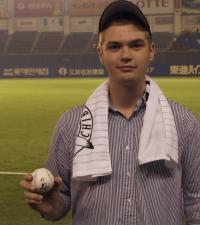 For more information, see:
For more information, see:
Ellen McCulloch-Lovell
Cailin Marsden
William Edelglass
Susie Bellici
Rosario de Swanson
Cookie Harrist
Or be sure to get the latest scoop on Potash Hill at these sites:
Potash Phil
Facebook
YouTube
Twitter

